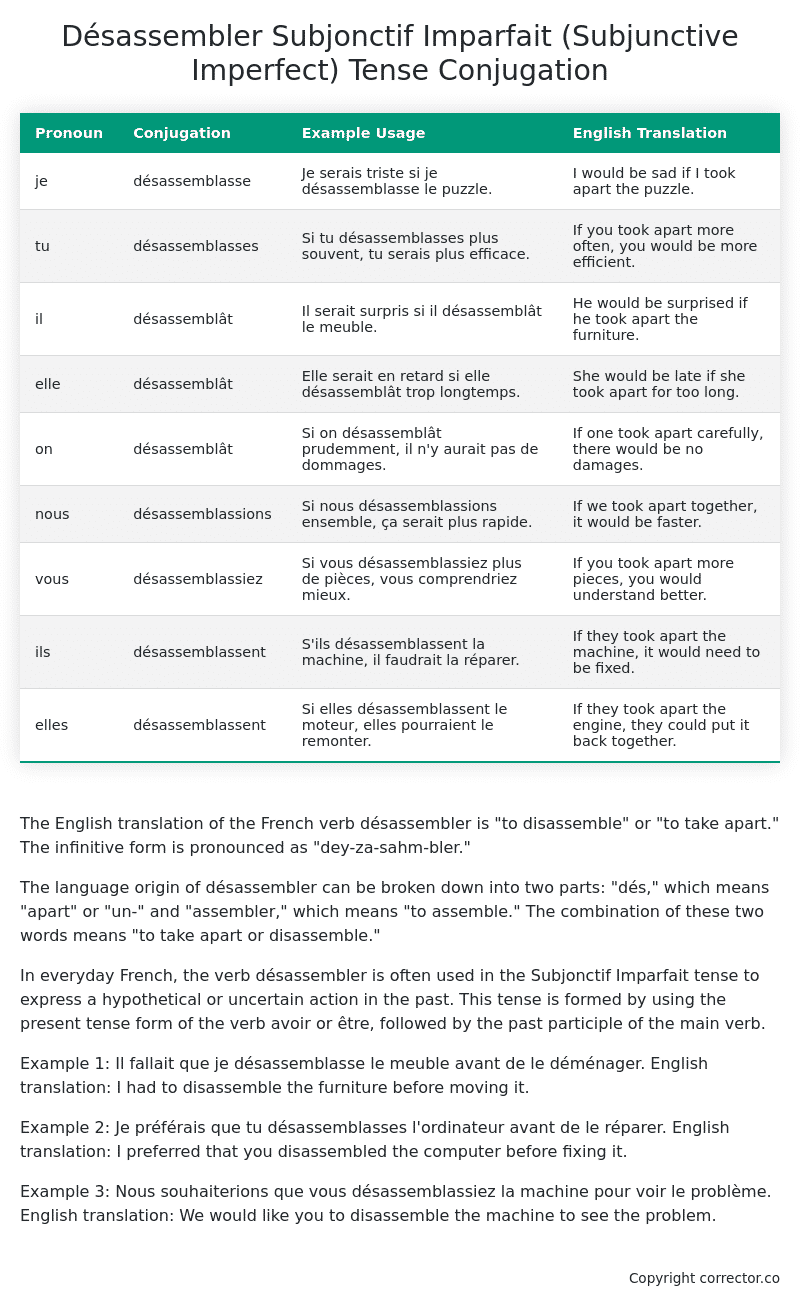Subjonctif Imparfait (Subjunctive Imperfect) Tense Conjugation of the French Verb désassembler
Introduction to the verb désassembler
The English translation of the French verb désassembler is “to disassemble” or “to take apart.” The infinitive form is pronounced as “dey-za-sahm-bler.”
The language origin of désassembler can be broken down into two parts: “dés,” which means “apart” or “un-” and “assembler,” which means “to assemble.” The combination of these two words means “to take apart or disassemble.”
In everyday French, the verb désassembler is often used in the Subjonctif Imparfait tense to express a hypothetical or uncertain action in the past. This tense is formed by using the present tense form of the verb avoir or être, followed by the past participle of the main verb.
Example 1: Il fallait que je désassemblasse le meuble avant de le déménager.
English translation: I had to disassemble the furniture before moving it.
Example 2: Je préférais que tu désassemblasses l’ordinateur avant de le réparer.
English translation: I preferred that you disassembled the computer before fixing it.
Example 3: Nous souhaiterions que vous désassemblassiez la machine pour voir le problème.
English translation: We would like you to disassemble the machine to see the problem.
Table of the Subjonctif Imparfait (Subjunctive Imperfect) Tense Conjugation of désassembler
| Pronoun | Conjugation | Example Usage | English Translation |
|---|---|---|---|
| je | désassemblasse | Je serais triste si je désassemblasse le puzzle. | I would be sad if I took apart the puzzle. |
| tu | désassemblasses | Si tu désassemblasses plus souvent, tu serais plus efficace. | If you took apart more often, you would be more efficient. |
| il | désassemblât | Il serait surpris si il désassemblât le meuble. | He would be surprised if he took apart the furniture. |
| elle | désassemblât | Elle serait en retard si elle désassemblât trop longtemps. | She would be late if she took apart for too long. |
| on | désassemblât | Si on désassemblât prudemment, il n’y aurait pas de dommages. | If one took apart carefully, there would be no damages. |
| nous | désassemblassions | Si nous désassemblassions ensemble, ça serait plus rapide. | If we took apart together, it would be faster. |
| vous | désassemblassiez | Si vous désassemblassiez plus de pièces, vous comprendriez mieux. | If you took apart more pieces, you would understand better. |
| ils | désassemblassent | S’ils désassemblassent la machine, il faudrait la réparer. | If they took apart the machine, it would need to be fixed. |
| elles | désassemblassent | Si elles désassemblassent le moteur, elles pourraient le remonter. | If they took apart the engine, they could put it back together. |
Other Conjugations for Désassembler.
Le Present (Present Tense) Conjugation of the French Verb désassembler
Imparfait (Imperfect) Tense Conjugation of the French Verb désassembler
Passé Simple (Simple Past) Tense Conjugation of the French Verb désassembler
Passé Composé (Present Perfect) Tense Conjugation of the French Verb désassembler
Futur Simple (Simple Future) Tense Conjugation of the French Verb désassembler
Futur Proche (Near Future) Tense Conjugation of the French Verb désassembler
Plus-que-parfait (Pluperfect) Tense Conjugation of the French Verb désassembler
Passé Antérieur (Past Anterior) Tense Conjugation of the French Verb désassembler
Futur Antérieur (Future Anterior) Tense Conjugation of the French Verb désassembler
Subjonctif Présent (Subjunctive Present) Tense Conjugation of the French Verb désassembler
Subjonctif Passé (Subjunctive Past) Tense Conjugation of the French Verb désassembler
Subjonctif Imparfait (Subjunctive Imperfect) Tense Conjugation of the French Verb désassembler (this article)
Conditionnel Présent (Conditional Present) Tense Conjugation of the French Verb désassembler
Conditionnel Passé (Conditional Past) Tense Conjugation of the French Verb désassembler
L’impératif Présent (Imperative Present) Tense Conjugation of the French Verb désassembler
L’infinitif Présent (Infinitive Present) Tense Conjugation of the French Verb désassembler
Struggling with French verbs or the language in general? Why not use our free French Grammar Checker – no registration required!
Get a FREE Download Study Sheet of this Conjugation 🔥
Simply right click the image below, click “save image” and get your free reference for the désassembler Subjonctif Imparfait tense conjugation!

Désassembler – About the French Subjonctif Imparfait (Subjunctive Imperfect) Tense
Formation
Common Everyday Usage Patterns
Interactions with Other Tenses
Subjonctif Présent
Indicatif Passé Composé
Conditional
Conditional Perfect
Summary
I hope you enjoyed this article on the verb désassembler. Still in a learning mood? Check out another TOTALLY random French verb conjugation!


